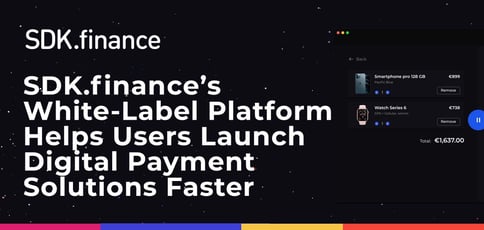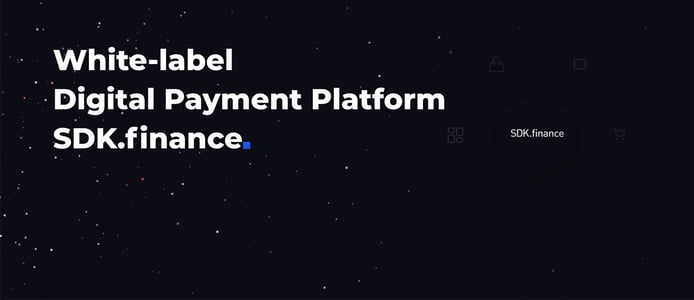
TL; DR: SDK.finance takes the time-consuming process of creating a FinTech product and reduces it dramatically with a white-label payment platform designed to reduce capital expenditure. The solution is available in a source code format that developers can modify and a managed solution for companies seeking a professional IT service. SDK.finance always aims to future-proof its products, most recently with an upcoming focus on machine learning and data science for risk management.
While the financial services industry is notoriously hesitant to embrace cutting-edge technology, consumers are not — and that demand is driving increased adoption rates.
In Ernst & Young’s 2019 FinTech Adoption Index, 75% of consumers surveyed across 27 global markets reported using at least one FinTech money transfer or payments service. That percentage has likely skyrocketed since then, as the pandemic spurred remarkable growth in digital services across industries.
But building your own digital payment product isn’t exactly easy.
“Developing a FinTech product in-house is a complicated and time-consuming process that can overwhelm teams and delay product launches,” said Pavlo Sidelov, CTO at SDK.finance. “According to our experience, it takes at least one year to build an MVP of any payment product from scratch.”

That’s why the SDK.finance team decided to channel its expertise into a white-label digital payment platform designed to accelerate time to market. Modern challenger banks like N26, Tandem, O2 — which provide banking services digitally without physical branches — have all outsourced their digital banking software from FinTech providers.
“White-label digital banking solutions with key pre-integrated features help users assemble best-in-class products and launch them with a much lower capital expenditure,” he said. “SDK.finance was set up exactly with that goal in mind.”
By eliminating the headache of product development, FinTech entrepreneurs are better able to focus on their core business goals.
“With SDK.finance, FinTech products, banking, and payment solutions can be launched 5 to 10 times faster,” Pavlo said.
Born from Years of Experience Developing FinTech Solutions
SDK.finance was formed in 2013 by a group of FinTech veterans with more than 15 years experience.
The group launched payment systems that accept online payments, e-money, self-service cash terminals, and money transfers before launching SDK.finance. The white-label payment platform was created to assist developers in bringing FinTech products to market as rapidly as possible.
“There’s only a limited amount of time for companies to capitalize on their innovative ideas by launching their payments solutions,” Pavlo explained. “The longer it takes to develop a product, the more chances there are for a competitor to capture the same niche or market share.”

Pavlo said market disruptors like Revolut — a digital-only banking and payments platform designed for spending overseas — have successfully scooped up customers from banks that were too sluggish to innovate.
“It’s much easier to capture an untapped market than to compete in a saturated one,” he said. “That’s why we put together all of the tools companies need to launch their products much faster than if they were to start from scratch.”
Forgoing digital transformation is never worth the money saved, he said.
“Catching up is exceedingly tough for businesses that miss a market opportunity,” Pavlo said. “By enabling our clients to accelerate time to market, we maximize their chances of success.”
Navigating Trends in Cloud Readiness, APIs, and AI
SDK.finance takes its clients’ feedback into consideration when updating its platform and adding features.
“As a pure B2B company, we cannot receive direct feedback from the end users of payment applications. Our clients’ support teams collect customer feedback,” he said. “Based on that information, our clients (bank or payment system product and business teams) provide us with a list of features they would like added.”
The banking and payment software provider invests a significant amount of time and money in keeping up with market trends and emerging technology.
“At SDK.finance, we believe that understanding the market is key to developing modern payment platforms and future-proofing our products,” Pavlo said. “We also devote a lot of attention to stability, high system performance, and security. These components are fundamental to any payment business.”
SDK.finance has witnessed numerous industry shifts since its inception. One major change relates to cloud readiness.
“Without clouds, testing and developing new products was extremely difficult and expensive,” Pavlo said. “Access to almost limitless cloud storage and processing power solves many modern challenges and helps us develop faster.”
The other industry shift is an emerging API-first approach to building application components. SDK.finance embraced methodology in 2016 and hasn’t looked back since.
“Without APIs, systems can’t communicate with each other natively. Solving this problem unleashes many compelling use cases that benefit consumers and companies alike,” Pavlo said. “As the financial industry continues to shift toward open banking and adopts more API initiatives, we will see more exciting products pop up.”
Available via Source Code & Dedicated Team Support
The SDK.finance platform features everything from easy onboarding with secure client registration flows to real-time currency exchanges and account-to-account transfers.
The team knows firsthand what it takes to develop real payment products and does the best job possible to provide everything clients need ahead of time.
“That’s why our product tour demonstrates the platform’s functionality from different points of view, such as a client, admin, business analyst, accountant, etc.,” Pavlo said.
SDK.finance administers the platform in two ways, depending on the needs of the customer. The company’s source code option provides vendor independence for enterprises and medium-sized companies with existing IT teams.
The dedicated team option, on the other hand, eliminates the headache of software development team management and is well-suited for medium-sized companies without IT teams. A cloud server solution is also forthcoming.
For those looking to set up a digital banking solution, SDK.finance’s robust, cloud-hosted server architecture makes it easy to set up a solution in no time.
SDK.finance maintains the efficiency, stability, and security of its retail banking software by working only with the most dependable infrastructure suppliers.
Exploring the Potential of Data Science in Risk Management
Pavlo told us the FinTech space has exciting opportunities on the horizon, specifically in terms of artificial intelligence, big data, and machine learning.
“Although the finance industry has always had an aversion towards advanced technology due to security concerns, cutting-edge data science can empower companies and steer them away from risk,” he said. “We are actively working on implementing machine learning technologies for payments companies that will empower them to leverage the substantial benefits of modern technology.”
In the context of banking, finance, and payments, data science means leveraging math and statistics to extract information from large amounts of data.
“Data science can be highly relevant for risk management, risk analysis, fraud prevention, real-time anomaly detection, and sales generation,” Pavlo said. “With many different techniques and approaches to choose from, data science can extract valuable information from structured and unstructured sources and identify irregularities to forecast future behavior and patterns.
The company is looking forward to seeing how clients use these new advances in technology to push the industry forward.
HostingAdvice.com is a free online resource that offers valuable content and comparison services to users. To keep this resource 100% free, we receive compensation from many of the offers listed on the site. Along with key review factors, this compensation may impact how and where products appear across the site (including, for example, the order in which they appear). HostingAdvice.com does not include the entire universe of available offers. Editorial opinions expressed on the site are strictly our own and are not provided, endorsed, or approved by advertisers.
Our site is committed to publishing independent, accurate content guided by strict editorial guidelines. Before articles and reviews are published on our site, they undergo a thorough review process performed by a team of independent editors and subject-matter experts to ensure the content’s accuracy, timeliness, and impartiality. Our editorial team is separate and independent of our site’s advertisers, and the opinions they express on our site are their own. To read more about our team members and their editorial backgrounds, please visit our site’s About page.

